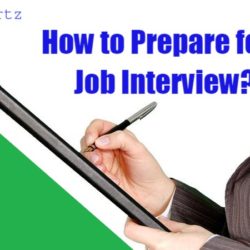
Most of us are terrified by this question. How do I start? What are the things I should or should not say? Do I stick to the facts from my resume? Should I start with my education or experience? These are just a few of the many questions roaming in our heads each time we have to face the tell-me-about-yourself awkwardness.
What the interviewer wants to hear
Trust me, no one wants to listen to a long autobiography starting with how you finished high school. What “tell me about yourself” really means is “sell yourself.”
Related: How to write your elevator pitch
You don’t need to wait until you get asked “why should we hire you?” or “what makes you a great fit for the role?” It is the main reason why you’re having the interview in the first place. Telling them about yourself is your ultimate chance to convince them you got their phone call for the right reasons.
The core of your answer isn’t actually yourself
Even though the question is technically focused on yourself, is it really what the interviewer is asking about?
Let’s think about it. As you probably already know from personal experience, you have greater chances of getting someone to like you if you put them first and start a conversation with what matters to them, not just you. How is a job interview any different?
If you want to hit a home run with your “tell me about yourself” answer, you have to put the needs of the interviewer first and build your pitch around it. The employer’s business needs will always be the top priority on their list, which makes it your top priority, too.
Their business needs are what determine which pieces of your profile and history are relevant for the interviewer, and which aren’t. If your years of experience working with a specific software don’t make you great at the job in question, it’s not worth spending time talking about that part of your work history.
To home in on which parts of your professional experience are most relevant to the job, try pasting your resume and the job description below for an instant analysis by Jobscan.
Focus on what sets you apart
Imagine a hundred people applying for the same job as you. All of them meet the job requirements listed in the posting and are really good at what they do. And then there’s you.
What sets you apart from those hundred candidates? What gives you an edge? Those would be the things that define you in the eyes of someone who is meeting you for the first time.
It cannot simply be the hard skills and qualifications listed in the job requirements, because the other applicants have them too. Maybe it’s what drives you to go above and beyond to do your job. Maybe it’s your experience in a closely related industry allowing you to have a much deeper understanding of the target market. Maybe it’s your unique ability to visualize the big picture and understand how to move different smaller parts to make the entire mechanism work more smoothly.
Each one of us has something unique to offer. If you have no clue how to look for what sets you apart, ask someone who has worked with you: your leaders, colleagues or clients. How would they describe you? What do they remember you for? That’s a great place to start.
What’s in it for them?
Remember how we mentioned that the employer’s business needs are at the top of the interviewer’s list of priorities? This is exactly why it is important for you to connect the unique attributes you bring to the table with what they are looking to accomplish if they hire you.
Think of yourself as an investment. If the employer sitting across the table from you decide to invest in you, what results can they expect?
Related: How to answer “What are your salary expectations?“
This is what people commonly refer to a value proposition. It is your job to relate your key selling points to the value you can add to their business – and you need to do it right away in your “tell me about yourself” pitch if you really want to capture their interest.
Use your own voice
Imagine your interviewer sitting all day listening to candidates saying, “I’m a result-oriented XYZ professional with X number of years…” Get the picture?
The interviewer is there to have a human conversation and get to know who you are in real life. It’s a pretty tricky task on its own, considering a couple of relatively short interviews is all they have to do that. Stiff, robotic resume lingo doesn’t make it any easier for them to like you and understand what you have to offer.
Avoid using cliché expressions or sounding like you’re simply reading your resume out loud. Instead, tell your interviewer what makes you the best fit for their company. A job interview is, first and foremost, a conversation with an objective to get to know one another better.
Examples: How to answer “Tell me about yourself”
“I have more than six years of experience in full cycle accounting. I believe that quality financial reporting is the key to improving the financial health of the company, which is exactly what I’ve been doing for the past three years in the FMCG industry. Most recently, I successfully completed a company-wide implementation of a new interdepartmental reporting and communication system. Throughout my career, my colleagues have known me as someone who is great at breaking down a big, complex task into smaller, manageable steps. It is what has consistently helped me improve the quality of financial reports, increase accounting efficiency, and significantly reduce administrative costs.”
Related: 10 common behavior interview questions and how to answer them
“My career in HR started about 8 years ago when I understood the real meaning behind the phrase ‘people are at the heart of any business.’ For the past 3 years, I have been working as an HR Director at the largest ABC bank branch in my city. Most recently, I have been leading a new project focused on increasing employee engagement and productivity. I’m passionate about building and strengthening communities and have been actively volunteering with multiple community-building initiatives. This experience has taught me more about what makes people tick and has helped me become a better manager.”
Practice your “tell me about yourself” pitch with someone
It’s no secret that it takes quite a bit of practice to feel confident about how you present your personal brand to the interviewer.
Before you get the chance to appear in front of your potential employer, practice with someone. Ask your spouse or a good friend to listen to your pitch, then compare your notes:
- Did your key message get delivered?
- How was it received?
- Was what the other person remembered exactly what you wanted them to remember from your answer?
If it’s not enough, consider working with a career coach. Besides providing you with actionable feedback, a coach can help you single out your most marketable attributes and tailor your “tell me about yourself” pitch to a very specific professional audience.
Whichever way you choose, make sure your interview have some kind of external feedback. Truth is, it is the only way to find out how convincing you are at presenting yourself. Source.
- HDFC Future Bankers Recruitment 2024 Latest Private Job Opportunities - 15/04/2024
- The Benefits of Working in Government Legal Jobs - 24/02/2024
- Top Highest Paying Bank Jobs in Hyderabad - 22/02/2024



